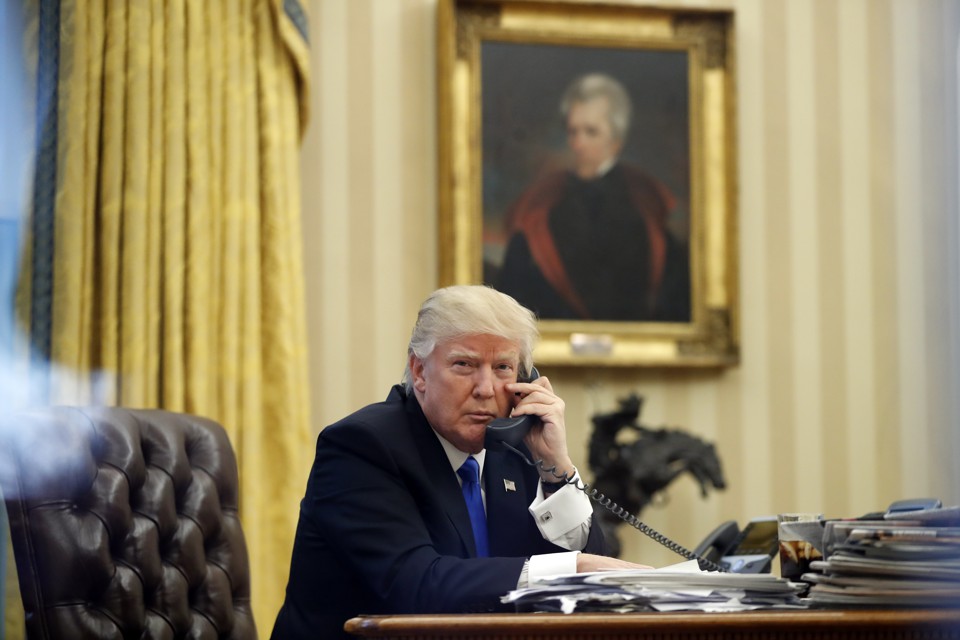Trump's Peculiar Understanding of the Civil War
The president’s admiration for deal-making and strong leadership lead him to suggest that Andrew Jackson could have stopped the Civil War.

In an interview with Salena Zito for Sirius XM radio, Trump discussed the nastiness of the 2016 campaign. (Sirius released a clip; the full interview is to air Monday afternoon.) He was told that the 1828 race between John Quincy Adams and Andrew Jackson was the most similar, he said.
“I said, ‘When was Andrew Jackson?’ It was 1828, that’s a long time ago, that was Andrew Jackson,” Trump said, a sign that the history to follow would be somewhat shaky. Reminiscing about a visit to Tennessee in March, Trump continued:
I mean had Andrew Jackson been a little later you wouldn’t have had the Civil War. He was a very tough person, but he had a big heart. He was really angry that he saw what was happening with regard to the Civil War, he said, “There’s no reason for this.” People don’t realize, you know, the Civil War, if you think about it, why? People don’t ask that question, but why was there a Civil War? Why could that one not have been worked out?As with so many things Trump says, the quotation is simultaneously deeply confusing, and yet also deeply revealing.
Jackson, though born in South Carolina and an advocate for states’ rights, took a hard line, getting authorization to use military force against the state to enforce the law, though a compromise tariff ended up resolving the crisis without armed conflict.
But assuming that this type of strong leadership, leavened with compromise, would have staved off the Civil War is dubious, for reasons raised by the rest of Trump’s answer: “People don’t realize, you know, the Civil War, if you think about it, why? People don’t ask that question, but why was there a Civil War? Why could that one not have been worked out?”
It is difficult to imagine that Jackson, as a Southern slaveholder and defender of slavery, would have been willing to stand against the South in the event of a civil war. But that’s ultimately beside the point: Even if he had, such a position would likely have stood little chance of preventing the war, which flowed from the Southern commitment to slavery.
Trump’s assertion that Jackson could have staved war off is a manifestation of Trump’s central, and perhaps only truly committed, political beliefs: a faith in the power of strength, and a faith in the power of dealmaking. It is why the president rushed to congratulate Turkish President Recep Tayyip Erdogan on a referendum empowering him and sapping democracy; it is why he is so fond of Egyptian President Abdel Fattah el-Sisi; and it is why on Sunday he invited the vicious Philippine President Rodrigo Duterte to the White House. If only there had been an Andrew Jackson in the White House, rather than a James Buchanan, goes the thinking, the war could have been averted.
The second, related assumption is that there might have been some compromise in the matter. But given the Confederate states’ commitment to slavery, there was not: Either the Union could have thrown up its hands, allowed secession, and allowed slavery to persist, or else a war was inevitable, no matter the dealmakers or strongmen involved.
It’s perfectly possible that Trump, despite attending good private schools in New York and then graduating from the University of Pennsylvania, is, like many Americans, ill-served by his education when it comes to the Civil War. Many Americans are still taught, incorrectly, that the war was essentially a conflict over state’s rights, with abolition as a byproduct of the war. This revisionist view flourished after the war, and though gradually being displaced, is common across the country. (Many erroneous beliefs about the war remain similarly common. In 2016, Coates and others criticized Hillary Clinton for her historically faulty gloss on Reconstruction, rooted in the revisionist “Dunning School” approach.)
Trump’s attempt to replicate this plays as caricature. Had the president read Goodwin’s book, it’s difficult to imagine he would have made the statement he did today. Trump has betrayed a weak grasp on American history, and in particular mid-19th century history, on several occasions. In February, he posted a fake Lincoln quote to Twitter. Marking Black History Month, Trump delivered a perplexing paean to a great abolitionist that suggested he believed the man was still alive: “Frederick Douglass is an example of somebody who’s done an amazing job and is getting recognized more and more, I notice.” In March, speaking about the most famous Republican president in history, Trump said, “Most people don’t even know he was a Republican.”
Trump’s repeated invocation of Jackson seems to be the work of Stephen Bannon who is Trump’s chief strategist and an apostle of Old Hickory. Bannon has tutored Trump in Jackson’s legacy in an attempt to get the president to model himself on and praise Jackson. But Monday’s bumbling historical commentary demonstrates that the lessons are not going all that well. Given the president’s busy schedule, perhaps he would be better served learning the details of the health-care bill he is championing, rather than muddling crudely through remedial U.S. history.
No comments:
Post a Comment